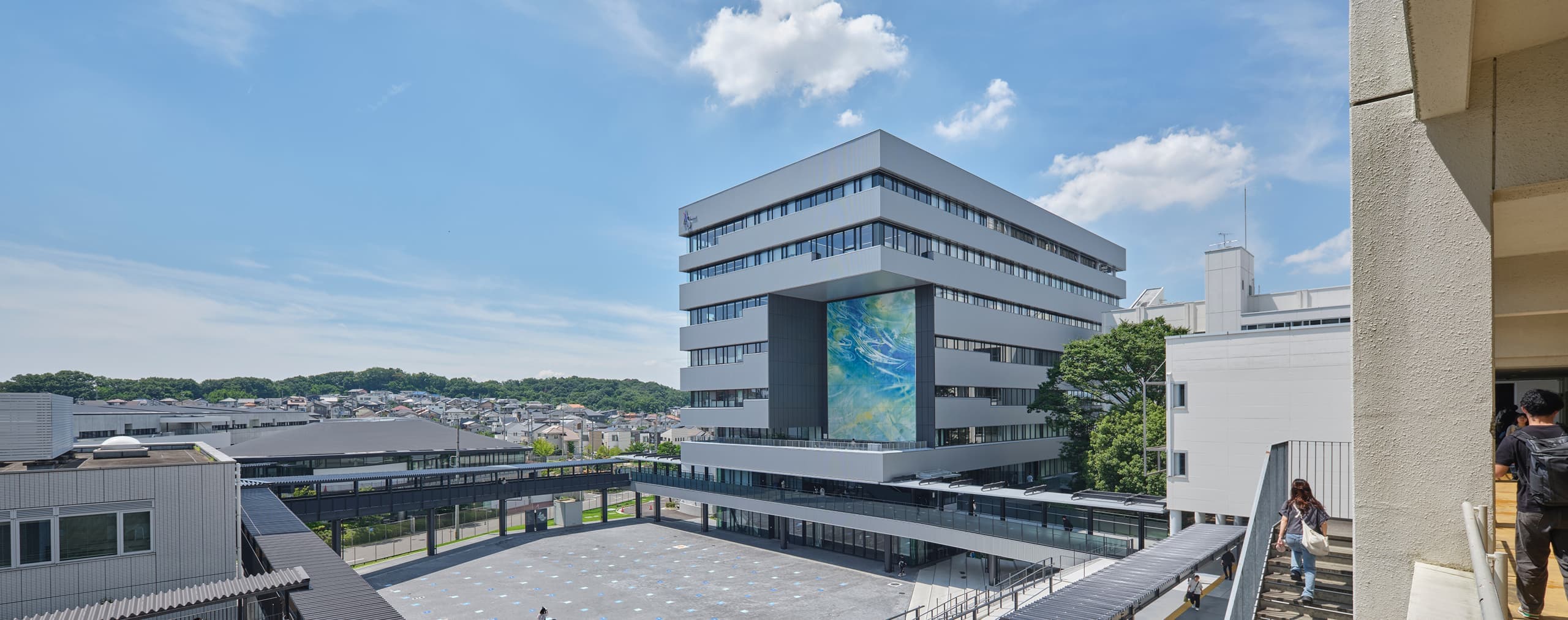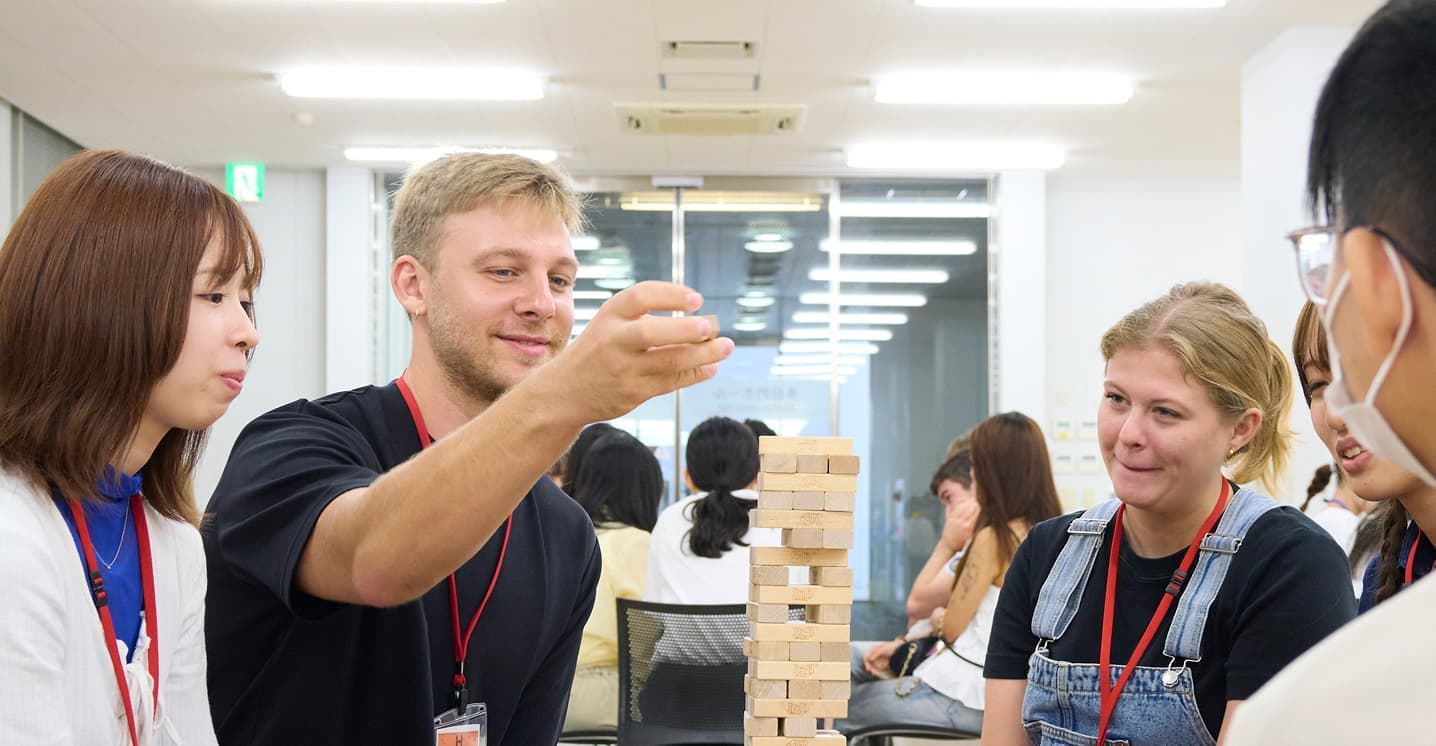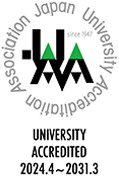
Educational Policy
Aichi Shukutoku University was founded in 1905 as a high school for girls and opened as a university in 1975. The school has been coeducational since 1995 and offers diverse learning opportunities.
Tradition Never Stands Still
Founded in 1905 during the early years of women's education in Japan, Aichi Shukutoku Gakuen began as the first private girls' high school in Aichi Prefecture. In an era when women's education focused mainly on home economics and sewing, the school's founder, Kiyosaku Kobayashi, looked to the future. He introduced English and science as core subjects and promoted sports. Kobayashi's pioneering initiatives also included the adoption of Western-style uniforms and the implementation of school excursions. These additions set the school apart from other girls' institutions and laid the groundwork for a new model of women's education. His vision of "nurturing individuals who will be of value ten or twenty years from now" became the enduring foundation of the institution's educational mission.
Even after World War II, amid sweeping changes to Japan's education system, the school continued to respond flexibly to the needs of a changing and diversifying society, eventually founding Aichi Shukutoku University in 1975. As the notion of "harmonious coexistence" emerged as a central social concern, the university marked its 20th anniversary in 1995 by becoming co-educational and expanding into a multi-faculty institution. To carry forward and further realize its founding educational ideals, the university articulated a new guiding philosophy of "Embracing Diversity" in order to carry on the educational goals we have had since the founding of the school and to achieve them in a more concrete and realistic manner. This philosophy is expressed through three key themes: Rooted in the community, open to the world; Valuing both the practical and the enduring; and Balancing strength with kindness. These ideas inform concrete practices such as the establishment of the Institute for Gender and Women's Studies, the enhancement of language education and international exchange programs, the expansion of hands-on learning through volunteering and certification training, and the development of fully accessible campus environments. Under the banner of its slogan, Tradition Never Stands Still, Aichi Shukutoku University continues to evolve as a university for a new era. It strives to create a learning environment where all lives are respected, regardless of nationality, language, culture, gender, age, or ability. A place where people can learn to live and grow together.
Faculty Objectives
Faculty of Letters
The Faculty of Letters is based on the fundamental principle of exploring the human condition, a universal theme that lies at the root of all academic disciplines. Based on this principle, our educational purpose is to cultivate capable individuals, including teachers, who can succeed in all fields of society. We achieve this by fostering the ability to investigate and solve problems from a broad perspective, grounded in a deep insight into humanity and society. This ability is developed by inheriting the intellectual and cultural heritage of humankind while simultaneously acquiring creative thinking skills oriented toward the future.
The three departments within the Faculty of Letters are founded on this core philosophy. Their individual missions and educational objectives are as follows:
The Department of Japanese Language and Literature aims to nurture individuals with the critical faculties, independent thinking, and refined sensibility necessary to contribute to society. Students develop a broad-based intellectual foundation and deepen their understanding of classical and modern Japanese literature, the Japanese language, and Chinese literature. With an awareness of cultural continuity and transformation in today's global society, the department provides both foundational and advanced instruction that supports the inheritance and further development of Japanese culture, history, and tradition.
Faculty of Education
The Department of Education cultivates practitioners who possess comprehensive and practical teaching skills. Students gain a multifaceted perspective on education, acquire specialized knowledge, and develop a strong commitment to understanding the full potential of each child. With this foundation, they learn to think proactively about improving responses to the social environments and diverse needs surrounding children. The program emphasizes the ability to provide appropriate guidance and support for all children, including those requiring special accommodations, thus preparing future educators capable of inclusive and responsive teaching.
Faculty of Human Informatics
The Department of Human Informatics aims to foster professionals who approach information technology from a human-centered perspective, contributing to the formation of a more livable information society in the age of AI. The department includes three majors: Kansei Engineering, Data Science, and Mathematics and Information Teacher Training.
The Major of Kansei Engineering prepares students to become STEAM professionals who can play active roles in building a sustainable society, through education and research that connect technology with human experience.
The Major of Data Science trains students to become experts in data analysis who can address the growing complexity and diversity of today's information society.
The Major of Education in Mathematics and Informatics prepares future middle and high school teachers who can communicate the depth and excitement of both mathematics and information science in an era when data literacy and AI skills are essential.
Faculty of Psychology
The Department of Psychology is guided by the principle of understanding the universality and diversity of the human mind. It offers a comprehensive approach to investigating human behavior from multiple perspectives within contemporary psychology. The program aims to foster individuals who can express themselves appropriately while respecting others, and who are equipped to respond effectively to the interpersonal challenges that arise in diverse human relationships.
Faculty of Creation and Representation
The Faculty of Creation and Representation is founded on the principle of cultivating creativity, the foundation of all expressive activity. Based on this principle, the faculty seeks to develop individuals capable of building integrated cultural practices and sharing knowledge and ideas through a variety of expressive forms, including language and media. The faculty offers two majors: Literary Arts and Representation and Media Theories and Production.
The Major of Literary Arts offered by the Department of Creation and Representation cultivates individuals who possess a nuanced understanding of linguistic and symbolic culture as intellectual assets. Students learn to articulate their ideas clearly and to appreciate the social value of preserving and sharing cultural expression. Through engagement with diverse cultural texts and practices, they develop sound judgement and acquire the knowledge and techniques necessary for creative work, especially in the literary arts.
The Major of Media Theories and Production, also offered by the Department of Creation and Representation, prepares students to plan and produce media content strategically, with a focus on visual media, video production, content creation, and communication design. The program equips students with the expertise and practical skills to respond to the challenges of an evolving media landscape, while fostering their ability to express themselves and communicate ideas effectively.
Faculty of Architecture
The Department of Architecture provides specialized education in a wide range of fields related to architecture, including planning and design, architectural history, materials, structural engineering, environmental systems, urban planning, and interior design. Through these studies, students cultivate communication skills, expressive ability, and creativity. The program's goal is to foster individuals who can contribute to solving real-world issues in architecture, interior design, urban development, and community planning, as well as to the creation of more fulfilling and higher-quality living environments.
Faculty of Health and Medical Sciences
The Major of Communication Disorders and Sciences in the Department of Medical Sciences prepares students for national licensure as speech-language-hearing therapists. It aims to foster professionals who possess the knowledge and skills necessary to support individuals with disabilities. These skills extend beyond the conventional scope of the profession, enabling graduates to identify challenges as they arise, develop and evaluate new techniques for testing and support, and apply logical, evidence-based reasoning.
The Major of Vision Sciences offered by the Department of Medical Sciences prepares students for national licensure as orthoptists. It aims to cultivate professionals equipped with the expertise necessary to support individuals with visual impairments. Students develop the ability to identify issues, devise and assess new therapeutic techniques, and think logically based on scientific evidence, fostering a capacity for both clinical practice and innovation.
The Major of Physical Therapy Sciences offered by the Department of Medical Sciences prepares students for national licensure as physical therapists, with a particular focus on pediatric physical therapy. Students acquire the specialized knowledge and skills to support children and individuals with disabilities, as well as the ability to identify clinical problems by integrating perspectives from other professional fields. They are trained to develop new assessment and support techniques and to apply scientific evidence through logical reasoning.
The Major of Medical Laboratory Sciences in the Department of Medical Sciences prepares students for national licensure as clinical laboratory technologists. It seeks to develop professionals with a strong ethical foundation and the expertise required for clinical testing. Students acquire the essential skills for collaborative, team-based medical care and are trained to identify and resolve clinical problems, engage in scientific inquiry, and develop and evaluate new diagnostic methods in line with technological advances.
The Major of Sports and Health Sciences offered by the Department of Sports and Health Sciences provides students with broad knowledge in sports, exercise, and health sciences. It aims to cultivate professionals recognized for their ability to support lifelong health maintenance and promotion. Students are trained to independently analyze issues related to lifelong health and to develop and implement effective solutions.
The Major of Emergency Medical Sciences offered by the Department of Sports and Health Sciences prepares students for national licensure as emergency medical technicians (paramedics). It offers foundational medical knowledge focused on health and emergency care and aims to develop individuals who can contribute to society. Students are trained to apply logical thinking grounded in scientific evidence, demonstrate keen observation and sound judgment, and communicate effectively, preparing them to play a central role in pre-hospital emergency care.
Faculty of Food and Health Sciences
The Faculty of Food and Health Sciences aims to develop professionals with expertise in food and nutrition who can contribute to improving the quality of life for all people. Students acquire knowledge of the relationship between diet, nutrition, and health, and are trained to address real-world issues related to food and public health based on scientific evidence and logical reasoning.
The Department of Health and Nutritional Sciences prepares students for national licensure as registered dietitians. It aims to develop individuals with broad-based knowledge, specialized scientific expertise, and advanced practical skills who can play a central role in building a healthy, long-lived society.
The Department of Innovative Food Sciences deepens students' specialized knowledge in food and nutrition and cultivates the comprehensive skills necessary in the fields of diet and health. It aims to develop professionals equipped with the knowledge and abilities needed to contribute to a rich dietary culture and a healthier society.
Faculty of Human Services
The Major of Social Services offered by the Department of Social Services prepares students for national licensure as certified social workers and psychiatric social workers. It aims to cultivate professionals who can contribute to society through practical, field-based engagement. Students acquire the specialized knowledge, practical skills, and mindset necessary for careers in welfare and education, as well as the capacity to contribute to the development of a mature welfare society.
The Major of Child Care and Education offered by the Department of Social Services prepares students to obtain qualifications as nursery school and kindergarten teachers, and to play a central role as professionals in early childhood education. Beyond that, it aims to foster individuals who can also draw on their understanding of social welfare to engage proactively with emerging societal needs.
Faculty of Global Culture and Communication
The Department of Global Culture and Communication fosters the ability to engage with people from diverse cultural backgrounds, to view society from a broad perspective, and to embrace diverse ways of thinking, living, and expression. Its educational programs aim to nurture students with a proactive attitude and the capacity to contribute to the creation of new societies and cultures. The department offers two majors based on this philosophy, the Major of Language Studies and the Major of Hospitality and Tourism Management.
The Major of Language Studies aims to develop individuals who have a deep understanding of language and culture, along with strong practical language skills. Students receive instruction in English, Chinese, and Korean, as well as training in Japanese language education for non-native speakers.
In a global society where cross-border travel is increasing and tourism plays a key role in regional economies, the Major of Hospitality and Tourism Management offers specialized instruction in tourism business, hospitality, and community development. Students develop multifaceted perspectives and learn to analyze tourism from global, marketing, and digital standpoints. The program equips them with practical skills and problem-solving abilities to address complex social issues.
Formerly the Major of Multicultural and Tourism Studies (name changed in 2025).
Faculty of Business
The Department of Business offers a comprehensive curriculum across multiple business disciplines with the aim of cultivating professionals who possess practical expertise and specialized knowledge suited to an increasingly globalized society.
Faculty of Global Communication
The Department of Global Communication provides both theoretical and practical training to help students develop advanced English proficiency and a broad liberal arts foundation. The program equips students with the ability to understand a constantly evolving international society, remain engaged with both domestic and global issues, and adopt a genuinely global perspective.
Graduate School Objectives
Graduate School of Creativity and Culture
The Major of Creativity and Culture aims to integrate advanced expertise with holistic approaches to cultural production.
Its mission is to explore, examine, and propose new ways of integrating science and technology with spiritual and cultural life in response to the needs of contemporary society. To that end, the program takes a broad view of human creative activity and unites the following areas into a single integrated major: Japanese literature (Major in Japanese Language and Literature), library and information science (Major in Library and Information Science), information design and systems (Major in Information Design and Systems), creative writing (Major in Literary Arts), media studies (Major in Media Theories and Production), and spatial design (Major in Architecture and Interior Design). By focusing on representational culture in its broadest sense, the program deepens students' specialized knowledge in each field while cultivating interdisciplinary perspectives. Its ultimate educational aim is to foster the pursuit of advanced, creative expression.
Graduate School of Education
The Department of Developmental Education (Master's Program) is designed to train educational leaders, including teachers, who can meet the needs of a new era of education. The program equips students with a wide-ranging and in-depth understanding of human development and education, and cultivates the ability to analyze and examine problems logically. It also emphasizes the development of advanced practical teaching skills, enabling graduates to provide tailored instruction that responds to the individual characteristics of each child.
Graduate School of Psychology and Medical Sciences
The Department of Psychology and Medical Sciences offers interdisciplinary education and training across a wide range of fields, including psychology, clinical psychology, social welfare, speech-language-hearing sciences, communication disorders, vision therapy, visual correction, and sports and health medical sciences. These fields, though distinct in nature, are closely interconnected. With an emphasis on collaboration across disciplines, the program provides integrated instruction that equips students with advanced expertise. Its aim is to develop professionals who can apply their specialized knowledge to research, development, and practical activities across diverse sectors of society.
Graduate School of Health and Nutritional Sciences
The Department of Health and Nutritional Sciences (Master's Program) seeks to develop highly specialized professionals with strong ethical principles and advanced knowledge and skills in human nutrition, food, the environment, and related clinical medical sciences. The program trains students to identify and solve regional health issues through cross-disciplinary collaboration and to demonstrate leadership in implementing those solutions.
Graduate School of Global Culture and Communication
The Department of Global Culture and Communication integrates two interrelated tracks: the Course in Language and Culture and the Course in Multicultural Studies. Emphasizing interdisciplinary and practical language skills, the program aims to cultivate individuals who are able to participate actively in research and practice within global society. Students develop the analytical and operational abilities needed to engage with global issues, grounded in information literacy and a strong command of language.
Graduate School of Business
The Department of Business aims to cultivate individuals with advanced expertise and a broad, interdisciplinary perspective. Its educational objective is to develop professionals capable of engaging in high-level research and pursuing innovative solutions to complex challenges.
This site uses a machine translation service.




